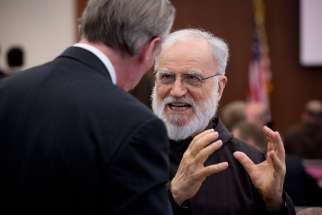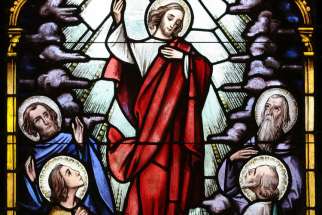Jesus would have been a great 'fit' on TV
VATICAN CITY - The Gospel is made for television and Jesus Christ would have been a perfect on-air evangelist, said the papal preacher.
Our gaze upon our city mirrors Jesus’ on Jerusalem
Jesus, it seems, had mixed feelings towards the world. He loved the world, laid down His life for it and challenged us to love the world, even as He criticized it harshly and stated clearly that it was opposed to Him.
No shortcuts to the Lord
Ascension of the Lord (Year A) June 1 (Acts 1:1-11; Psalm 47; Ephesians 1:17-23; Matthew 28:16-20)
The people who witnessed the ascension of Jesus didn’t really understand what God was up to and they were not exactly in sync with the mind and heart of God. We perhaps share more with them than we care to admit.
VATICAN CITY - In the humble act of washing his disciples' feet, Jesus is showing all Christians how he wants them to serve others with love, Pope Francis said.
The truth of Christmas: it’s hard to believe
The event we celebrate at the feast of Christmas is mind-boggling: the Incarnation, the enfleshment of God in a historical person, Jesus of Nazareth.
Jesus key to the new evangelization
TORONTO - The challenge the Catholic Church faces with the new evangelization is to lead people out of the darkness, theologian and Catholic apologist Scott Hahn told a Toronto audience Oct. 20.
More than 1,400 people came to hear Hahn describe the new evangelization, its challenges and goals at Canada Christian College. He was brought to Canada by Catholic Chapter House for “The New Evangelization! Equipping Yourself To Engage The Culture.”
“Evangelization is the grace and vocation most proper to the Church,” said Hahn. “The new evangelization is new precisely because of the unique needs we now have. It’s re-evangelizing the secular cultures that are on the brink of losing any sense of their own Christian identity.”
A former Presbyterian minister, Hahn joined the Catholic Church in 1986. Since then he has penned 13 books, been awarded a doctorate in systematic theology from Marquette University and is president of St. Paul Centre for Biblical Theology, a Christian think thank in Steubenville, Ohio, which he founded in 2001.
In defining new evangelization, Hahn made note of four principle laws of evangelization: God loves you; you sin; Christ died for your sins; and what are you going to do? By acknowledging these fundamental aspects of Catholic evangelization, one is able to build the foundational personal relationship with Jesus.
“A personal relationship with Jesus is where we all have to begin but it’s only a beginning, it isn’t the end,” said Hahn.
That’s because the new evangelization goes far beyond developing a personal relation by reaching towards an understanding of the covenant of communion that reflects the inner life of God, the Son and the Holy Spirit.
The best way to develop, and promote, the connection to one’s faith is through attention to the real presence of Christ in the Eucharist. In other words, one must be able to see it as a holy sacrifice of Jesus’ body and blood rather than unleavened bread and a chalice of wine. Where people of the past would simply accept this because a priest said it was so, today society demands an understanding of it and that is the goal of new evangelization. Our greatest tool to find this understanding, said Hahn, is the Catechism of the Catholic Church.
“It isn’t something that is just over and done in a day,” he said. “It’s something that you can start anywhere you find yourself but it is always going to lead to the goal of eucharistic communion.”
But new evangelization faces resistance even from those already deeply connected to their Catholic faith. Hahn summarized the common objections to undertaking the task into two categories: Catholics don’t evangelize and it’s not about telling, it’s about action. To both Hahn has one response.
“To be a Catholic is a call to bear witness to our faith no matter where we find ourselves in life. To not share is to not be Catholic.”
Papyrus fragment with reference to Jesus' 'wife' stirs debate
ROME - Scholars are unlikely to agree any time soon on the authenticity of a newly published text containing a reference to Jesus' "wife."
But the tiny papyrus fragment, purportedly dating to the fourth century., has already stirred interest in the early Church's attitudes toward marriage, sex and the role of women.
The fragment of papyrus with eight lines of Egyptian Coptic writing is the "only extant ancient text which explicitly portrays Jesus as referring to a wife," wrote Karen L. King, historian of Christianity at Harvard Divinity School, in an academic paper she delivered Sept. 18 at an international Coptic studies conference in Rome.
"It does not, however, provide evidence that the historical Jesus was married," she wrote, "given the late date of the fragment and the probable date of original composition" at the end of the second century.
The best source of evidence giving an account of Jesus' life and ministry is still the Gospels in the New Testament, King told reporters the next day, "and they are silent about His marital status." But she said the fragment is "direct evidence" that early Christians started debating in the second century whether Jesus could have been married or not.
Fr. Juan Chapa, a New Testament scholar at the University of Navarra in Spain, told Catholic News Service that the "Gospels don't mention marriage, not because they wanted to hide something, but because it was clear that Jesus did not get married, and it's consistent in the Church's tradition." He also noted that the gnostic gospel genre to which the fragment evidently belongs is one of stories about Jesus that mainly take place after the Resurrection, using language that is heavily allegorical. Thus, he said, the fragment's relevant words —"Jesus said to them, 'My wife' ” — were likely not meant as a literal assertion about the life of the historical Jesus.
King said that the significance of the fragment lies in the light it might shed on debates in the early Church over the necessity of celibacy to living a holy life.
According to Michael Peppard, a professor of theology and Coptic language at Fordham University, a belief in asceticism saw rapid development in the second to fourth centuries, especially in Egypt where Christian monasticism was born. Some bishops at the time "were saying that the highest ideal was asceticism," which included renouncing "all the trappings and worries of material life," including marriage. But Peppard said other bishops in the same period "were figuring out how to give everyone their space," and letting it be known it was all right for Christians to live in the world.
The new text published by King may be a sign of early Christians "pushing back" against asceticism and moving closer to mainstream Jewish attitudes "of blessing sex and procreation," Peppard said.
Catholic teaching, Chapa said, holds that "Jesus' celibacy, by differentiating Him from other rabbis, underlines His unique mission to fulfill the kingdom of God, and shows how He embodied the love of God" by renouncing conjugal love.
King said the reference to Jesus' wife could just be a symbol of the Church, akin to the Gospel allegory of Jesus as bridegroom of the Church.
"What if what's missing is saying, 'My wife is the Church?' ” King said.
But both Peppard and King argue that the word does refer to a real person, since the line just below it includes the words: "...she will be able to be my disciple..."
The "wife" in question could be a "spiritual wife," Peppard said. Other texts from the same period uphold "the image of an unconsummated spiritual marriage where the best kind of husband and wife live celibately," he said.
King acknowledged that there would be continued debate over the authenticity of the fragment, whose paper trail goes back only to the 1980s.
"I would say it's a forgery," Alin Suciu, a papyrologist at the University of Hamburg who was attending the conference with King, told the Associated Press. "The script doesn't look authentic" compared to other fourth-century Coptic papyri.
But Roger Bagnall, a papyrologist and director of the Institute for the Study of the Ancient World at New York University, studied the handwriting, the grammar and how the ink was absorbed by the plant fibres, and concluded it was likely to date from the period between 350 and 400.
"We can't ever know or be 100-per-cent sure if it's authentic or a forgery," Peppard said.
King said any properly accredited scholar in the world is welcome to study the papyrus, and that criticism of her findings is part and parcel of any historical study.
"We want to do the best job we can with new historical data," she said.
Chapa called King's discovery "exciting," and nothing for believing Catholics to fear.
"Anything that helps us understand our past, to understand the history of the Church and how the Church defined herself in history," he said, "is very valuable and positive."







